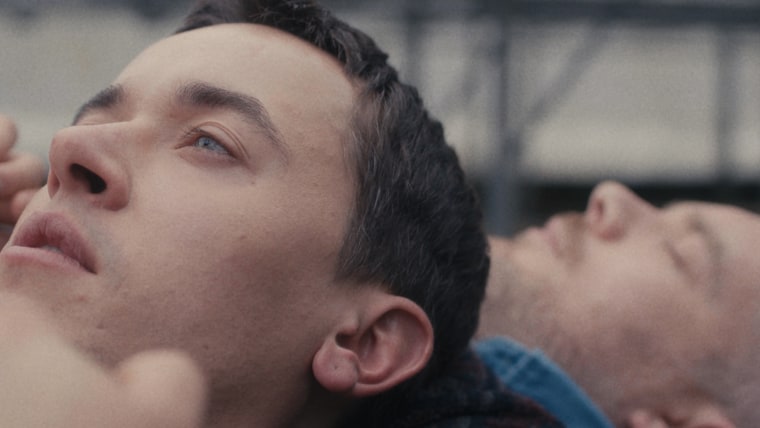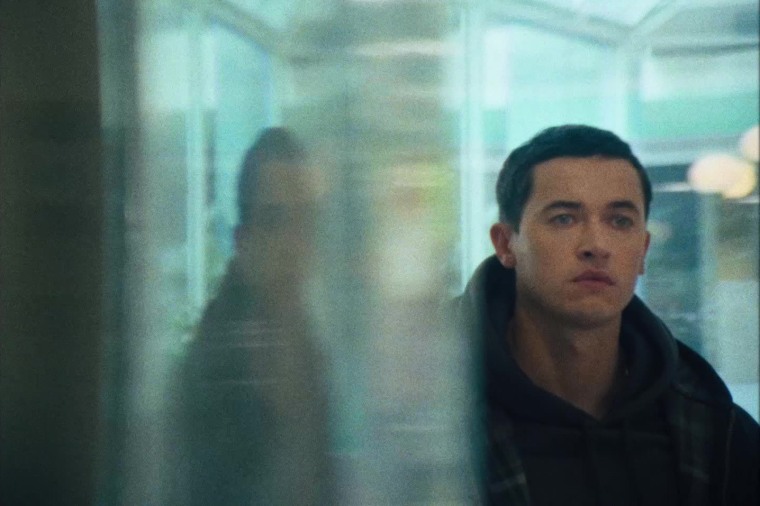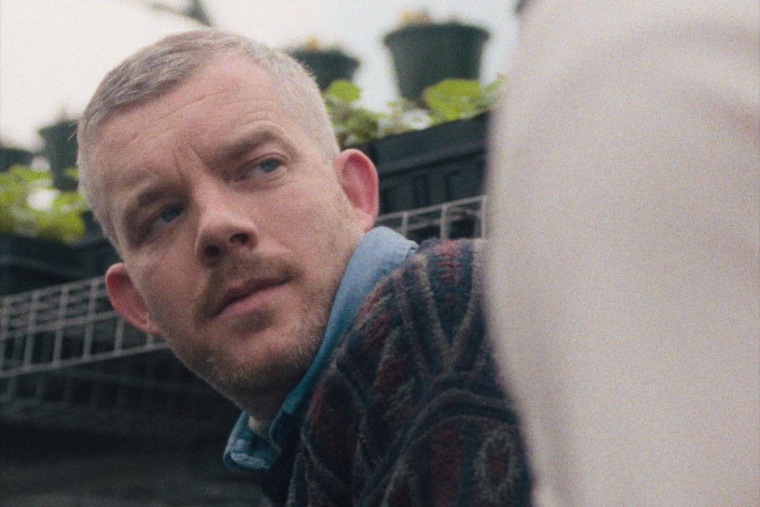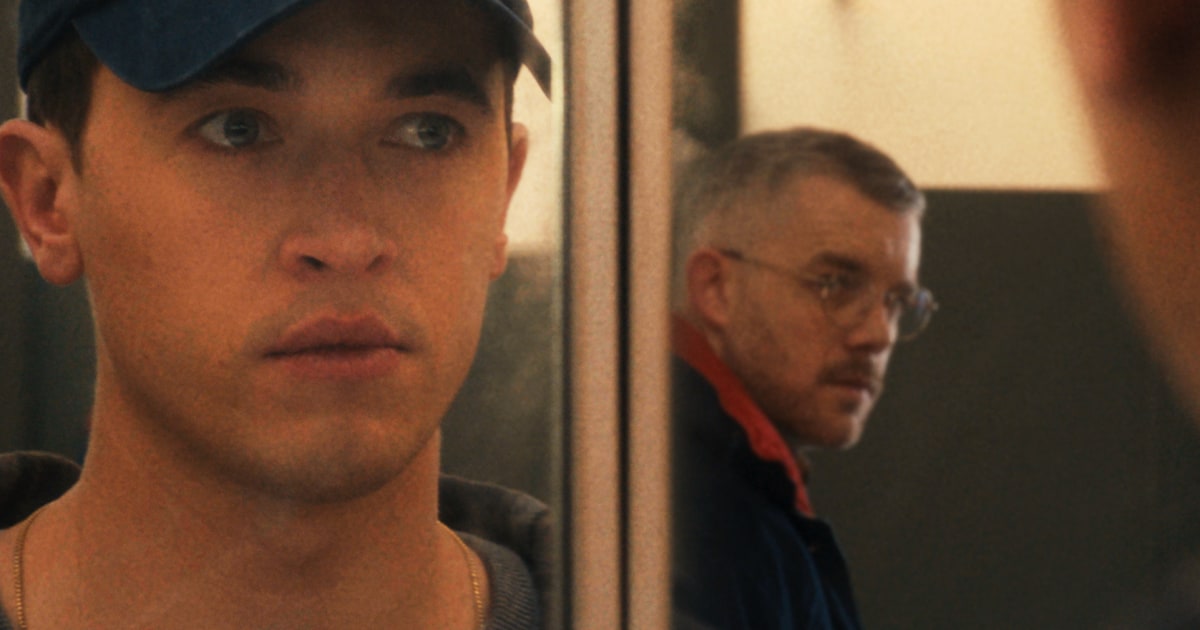In 2016, aspiring writer-director Carmen Emmi came across a Los Angeles Times article about undercover cops who would arrest gay men on charges of lewd conduct in public bathrooms — a controversial tactic criticized as a form of entrapment. Around that time, Emmi, then a film student at the University of Southern California, had just come out and his brother was in the process of becoming a police officer.
Emmi channeled those experiences into his feature directorial debut, “Plainclothes,” which arrives in theaters Friday. Set in Emmi’s native Syracuse, New York, in the 1990s, the independent film follows Lucas (Tom Blyth), an undercover cop wrestling with his own sexuality while simultaneously leading a local police effort to lure and apprehend gay men on charges of cruising in a mall bathroom. Against his better judgment, Lucas secretly falls for Andrew (Russell Tovey), a sensitive, older gay man who becomes one of the targets of his sting operation.
While the film largely unfolds as a psychological thriller told from Lucas’ perspective, “Plainclothes” is, at its core, a steamy romantic drama built around the crackling chemistry of its leads. When they first started discussing the film in early 2023, Blyth and Emmi agreed that they wanted Tovey — whom they had watched as a heartthrob in HBO’s gay romantic drama “Looking” — to play Andrew. After the actors’ virtual chemistry read, Blyth recalled texting Emmi, “I felt like there were fireworks going off in the Zoom.”
In a joint interview with Tovey, Blyth told NBC News that the nature of the film — which he said required the lead actors to trust each other in order to go to a really “vulnerable place” — made this chemistry a necessity.

“The two men, when they meet, are in two individual stages of hiding, fear and vulnerability, and the reason they connect is because they really see each other through that,” Blyth, 30, said of the main characters. “A big part of that is just showing up and being able to be playful. Being on set with Russell is very fun, always, and that makes it so much easier when you’re tackling the heavy, emotional stuff.”
In preparation for the role, Blyth said he researched the realities of being an undercover cop and being gay in the ’90s in a smaller city without a big queer community. The combination of those two stressors would put an “immense” amount of pressure on anyone, he added. “We talked about how his breath catches in his chest when he’s hiding himself, when he’s putting on his cover as a straight cop, which ultimately he has to shed and then he can breathe again.”
When the characters first meet in the mall bathroom Lucas is surveilling, they feel like they have known each other forever, Tovey said. “They’re both desperately looking for or needing a connection that’s real. I think that’s why that spark happens, because they can spot it in each other. It’s unspoken.”
Blyth noted that Lucas is experiencing many of his firsts with Andrew. “As an actor, it’s always fun to play someone’s first time experiencing something. You get to play the wonder, the awe and the childlike quality of, ‘This thing scares me and excites me at the same time,’” he said.

“There’s a nice dynamic there, because Lucas looks to Andrew as a lover and a mentor at the same time,” Blyth added. “He’s learning from him as he’s falling in love with him.”
Tovey, 43, pointed out that, for most of the film, “there is a power dynamic” between Lucas and Andrew that is based on their difference in “age and experience.” Once Andrew discovers that Lucas has never had sex with another man, Tovey said he felt strongly that his character should educate the younger man about what a healthy sexual experience can look and feel like.
“Andrew wants to make sure that, whatever happens, Lucas feels like his first experience was a good one. He isn’t someone that’s just thinking, ‘I’ve got a hookup. I’m going to get as much out of this guy as I can and then dump him.’ He feels the responsibility to make sure that Lucas is safe,” Tovey said. When the time came to shoot their first sex scene in the back seat of a van, Tovey added, he wanted it to be apparent to the viewer that the two men made a decision to wear condoms.

That whirlwind, fleeting romance ultimately transforms Lucas’ life for the better. “Lucas basically discovers how to be brave and how to believe in himself. He takes a risk to admit a massive truth about himself to his whole family at a family gathering, and he wouldn’t have gotten there if it wasn’t for Andrew,” Blyth said.
Andrew is left similarly altered by the liaison, but Tovey said his character is “also trapped by his secrets” and the pain “he lives with” on a daily basis. “But there’s some hope in Andrew that he gave this gift to Lucas. There’s a part of him that feels like, ‘I did a good thing,’ even if he himself can’t be his authentic self.”
Despite publicly identifying as gay his entire career, Tovey has developed a penchant for playing closeted men, which he has done so in “American Horror Story,” “Feud: Capote vs. the Swans,” “Angels in America” and now “Plainclothes.” While he has not intentionally sought out those kinds of roles, the actor said, he is “always drawn” to playing “characters that are struggling with their identity, with their emotions, with their relationships.”
“I’m always drawn to the truth in what it is to be a human being and what it is to be a queer person, and in today’s climate, I just feel it’s fundamental to be more visible than ever,” he said. “We have to prove our existence. The only way to really do it is through art. We have to keep telling these stories, because if they exist in art, then they exist in reality. We have to tell stories that help people see similarities in these characters, rather than differences.”
Tovey has never appeared overly concerned with how he is perceived by Hollywood — or the general public. Early in his career, he waved off concerns that playing mostly queer characters would typecast him as a gay actor. He never set out to be a “possibility model,” a term coined by trans actress Laverne Cox to describe a public figure who can serve as a beacon of inspiration for those struggling with the same marginalized identity.
“I just wanted to play these characters. They felt connected to me, to the way that I live my life, to my romantic interests, to my friendship groups and my community, so I was able to draw on those to tell these stories better,” he said.
But having come of age in the late ’90s and early aughts — when the AIDS epidemic was finally being addressed, and the United Kingdom’s anti-gay Section 28 laws were being repealed — Tovey said he now feels a renewed duty to tell as many queer stories as possible, especially at a time when many world leaders, including President Donald Trump, have been rolling back legal protections for LGBTQ people.
“I stand on the shoulders of giants. The reason I get to tell these stories and say I am who I am is because of the hard work that so many other people — fundamentally, trans people — did back in history,” Tovey said. “I’m so proud now that I can be an advocate and someone that is visible and a possibility, and someone that can use what platform I have to raise awareness of the plights of many people, especially trans people. I feel very proud of my position, but I also know that it does carry responsibilities and, in the current climate, I don’t take them lightly.”

